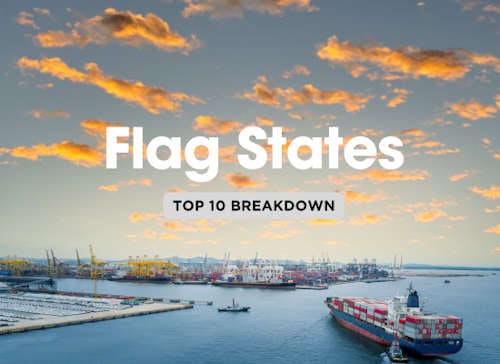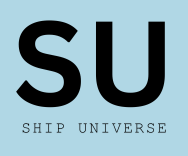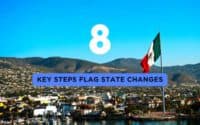Top 10 Flag States for Ships: Navigating Compliance, Costs, and Market Reputation

Flag state selection is a strategic decision that impacts nearly every facet of a ship’s operation, from compliance and cost to safety and reputation. With over 90% of the world’s fleet registered under just a handful of flags, certain flag states dominate the maritime industry, attracting shipowners with their combination of regulatory flexibility, cost efficiency, and solid support for international standards. In this guide, we’ll explore the top 10 flag states—each chosen for its unique blend of advantages—and dive into the five primary concerns shipowners have when selecting a flag state. First up: regulatory compliance and safety standards.
** Data is fluid and can contain inaccuracies. Please send any feedback to editor @ shipuniverse.com **
#1 Regulatory Compliance and Safety Standards
When it comes to flag states, regulatory compliance and safety standards are paramount. Each flag state enforces a unique blend of international regulations, including SOLAS, MARPOL, and ISM, which directly affect the ship’s operational requirements. A flag state’s reputation for compliance also influences how often its vessels are inspected and detained, impacting overall operational efficiency.
| ShipUniverse: Regulatory Compliance and Safety Standards by Flag State | |||
|---|---|---|---|
| Flag State | Regulatory Rigor | Compliance Standards | Reputation in PSC Inspections |
| Panama 🇵🇦 | Moderate – Flexible compliance with key international standards but less rigorous enforcement. | SOLAS, MARPOL, ISM compliant; may see occasional inspection due to moderate safety rigor. | Mixed – High number of vessels, but occasionally flagged for more inspections in ports. |
| Liberia 🇱🇷 | High – Strong commitment to international compliance; recognized for proactive safety enforcement. | Adheres to SOLAS, MARPOL, and ISM; ISO 9001 certified for registry quality management. | Positive – Fewer detentions; favorable view in PSC inspections. |
| Marshall Islands 🇲🇭 | High – Known for rigorous adherence to international standards; high-quality registry. | Compliant with SOLAS, MARPOL, and ISM; strong focus on safety and quality management. | Positive – Low detention rates; respected by port state control authorities. |
| Hong Kong 🇭🇰 | High – Enforces strict compliance aligned with IMO and national regulations. | Meets SOLAS, MARPOL, ISM; stringent guidelines for ship safety and crew welfare. | Positive – Generally low detention rates, with a strong safety record. |
| Singapore 🇸🇬 | Very High – Renowned for strict compliance and advanced maritime regulations. | Fully compliant with SOLAS, MARPOL, ISM; strong support for green and sustainable initiatives. | Excellent – Highly regarded in PSC, low detention rates, good reputation globally. |
| Bahamas 🇧🇸 | High – Focus on compliance, particularly for cruise ships and cargo vessels. | Aligns with SOLAS, MARPOL, ISM; promotes environmental and safety standards. | Good – Generally favorable inspection record, respected in the cruise industry. |
| Malta 🇲🇹 | Moderate-High – Growing emphasis on safety compliance in line with EU standards. | SOLAS, MARPOL, ISM compliant; adheres to EU directives for safety. | Good – Low detention rates, strong PSC compliance within the EU. |
| Greece 🇬🇷 | High – Emphasizes strict compliance with international and EU standards. | SOLAS, MARPOL, ISM, and EU standards compliant; rigorous inspection protocols. | Positive – Favorable PSC reputation, particularly in the EU. |
| Cyprus 🇨🇾 | Moderate – Aligns with EU standards but offers flexibility for shipowners. | Compliant with SOLAS, MARPOL, ISM; benefits from EU regulatory oversight. | Good – Strong PSC standing, particularly within the EU. |
| Japan 🇯🇵 | High – Emphasizes strict compliance with safety and environmental standards. | Follows SOLAS, MARPOL, ISM; strong focus on environmental initiatives. | Very Positive – Highly regarded for PSC compliance, low detention rates. |
#2 Cost of Registration and Ongoing Fees
The cost of registering a vessel under a particular flag state and the ongoing fees can vary greatly, influencing a shipowner’s decision. Some flag states offer competitive registration fees and lower ongoing costs, making them attractive to owners focused on budget. Others may have higher fees but offer added benefits, such as better support services, fewer port state inspections, and a reputation for quality and compliance.
| ShipUniverse: Cost of Registration and Ongoing Fees by Flag State | |||
|---|---|---|---|
| Flag State | Registration Fees | Annual Renewal Fees | Additional Costs / Services |
| Panama 🇵🇦 | Low – Typically $1,500 to $3,000 depending on vessel size. | Moderate – Around $1,000 to $2,500 annually, varies with vessel type. | Additional fees for tonnage, inspections, and flag endorsements. |
| Liberia 🇱🇷 | Moderate – Around $2,000 to $4,000, depending on gross tonnage. | Moderate – Typically $1,200 to $3,000 annually, based on tonnage. | ISO 9001-certified registry, additional tonnage-based fees. |
| Marshall Islands 🇲🇭 | Moderate – Ranges from $2,500 to $5,000 based on vessel size. | Moderate – $1,500 to $3,500 annually, adjusted for vessel tonnage. | Offers customer support and compliance guidance services. |
| Hong Kong 🇭🇰 | Moderate – Generally between $2,000 and $4,500 for registration. | Moderate – Annual fee around $1,000 to $3,000 based on vessel size. | Additional fees for inspections, plus maritime training support. |
| Singapore 🇸🇬 | Higher – Registration fees typically $3,000 to $6,000, varies with tonnage. | Higher – Approximately $2,500 to $4,000 annually, based on vessel type. | Includes extensive compliance support and digital registry services. |
| Bahamas 🇧🇸 | Higher – Average $4,000 to $6,000 depending on gross tonnage. | Moderate – Annual fees around $2,000 to $3,500, vessel-dependent. | Additional costs for luxury vessel inspection and compliance services. |
| Malta 🇲🇹 | Moderate – Usually $2,500 to $5,000, varies with vessel size and type. | Moderate – Approximately $1,500 to $3,000 annually. | Additional tonnage taxes; EU compliance benefits for owners. |
| Greece 🇬🇷 | Higher – Typically $4,000 to $7,000 depending on vessel size. | Higher – Annual fees $2,500 to $4,500, adjusted for tonnage. | Additional fees for EU regulatory services and inspections. |
| Cyprus 🇨🇾 | Moderate – Around $2,000 to $4,500 depending on vessel tonnage. | Moderate – Typically $1,500 to $3,500 annually, vessel size dependent. | Additional tonnage tax benefits; EU compliant. |
| Japan 🇯🇵 | Higher – Typically $5,000 to $7,000 based on vessel size and type. | Higher – Annual fees around $3,000 to $5,000, varies with tonnage. | Strong regulatory support, high compliance for safety inspections. |
#3 Crew and Labor Requirements
Flag states impose various requirements around crew composition, labor standards, and welfare to ensure that ships operate safely and fairly. These regulations can include minimum wage standards, crew nationality quotas, and work-hour limits, which impact staffing flexibility and costs. For shipowners, understanding each flag state’s specific crew and labor requirements is crucial to maintaining compliance while managing operational efficiency.
| ShipUniverse: Crew and Labor Requirements by Flag State | |||
|---|---|---|---|
| Flag State | Crew Nationality Requirements | Labor Standards and Regulations | Minimum Wage Standards |
| Panama 🇵🇦 | Flexible – No nationality restrictions for crew members. | Complies with MLC (Maritime Labour Convention) standards, with moderate enforcement. | MLC minimum wage standards generally applied. |
| Liberia 🇱🇷 | Flexible – No specific nationality quotas, popular with multinational crews. | Enforces MLC requirements, including work-hour limits and crew welfare provisions. | MLC minimum standards enforced, with regular inspections. |
| Marshall Islands 🇲🇭 | Flexible – Allows multinational crews without restrictions. | Strict adherence to MLC; known for proactive labor rights enforcement. | Complies with MLC minimum wage standards and benefits. |
| Hong Kong 🇭🇰 | Flexible – No restrictions on crew nationality. | Follows MLC standards, with added requirements for crew welfare and safety. | MLC minimums enforced, plus additional welfare standards. |
| Singapore 🇸🇬 | Moderate – Flexible for most crew positions but may prioritize Singaporeans for some roles. | Strict MLC compliance, with additional regulations on hours of work and safety. | MLC minimum wages, with strict enforcement on overtime pay. |
| Bahamas 🇧🇸 | Flexible – No nationality restrictions, commonly used by cruise ships. | Enforces MLC standards, known for high standards in the cruise sector. | Adheres to MLC minimum standards for wages and welfare. |
| Malta 🇲🇹 | Flexible – Allows multinational crews with no quotas. | Complies with MLC and EU labor regulations, focusing on crew welfare. | MLC minimum wage and benefits, with EU oversight. |
| Greece 🇬🇷 | Moderate – Prefers Greek officers, but no strict quotas for other roles. | Strict MLC and EU labor compliance, with added crew welfare measures. | MLC minimum wage, with additional EU labor protections. |
| Cyprus 🇨🇾 | Flexible – No nationality restrictions, popular with multinational crews. | Adheres to MLC and EU standards for labor rights and crew welfare. | MLC minimum wage enforced, plus EU labor benefits. |
| Japan 🇯🇵 | Strict – Tends to employ Japanese officers, with flexible rules for other roles. | High compliance with MLC and national labor standards, including extensive safety training. | Higher than MLC minimum wage standards, especially for senior roles. |
#4 Reputation and Impact on Market Perception
The reputation of a flag state can significantly influence a ship’s marketability, affecting charter rates, insurance premiums, and access to certain ports. Flag states known for rigorous compliance and safety are often preferred in the global market, while those with a reputation for “flags of convenience” may face higher scrutiny during inspections.
| ShipUniverse: Market Perception and Reputation of Flag States | |||
|---|---|---|---|
| Flag State | Global Reputation | Market Perception | Charter and Insurance Implications |
| Panama 🇵🇦 | Moderate – Known as a “flag of convenience,” popular for its low costs and flexibility. | Mixed – Viewed as practical but sometimes questioned for regulatory leniency. | Can result in higher insurance premiums and extra scrutiny in certain ports. |
| Liberia 🇱🇷 | High – Respected as a top-quality “flag of convenience” with strong compliance. | Positive – Favored by owners for quality service and reputation in global markets. | Competitive insurance rates; fewer restrictions in most markets. |
| Marshall Islands 🇲🇭 | High – Known for strict safety and regulatory adherence; globally respected. | Very Positive – Seen as a high-quality flag state, ideal for serious operators. | Low insurance rates, favorable for charterers seeking reliable fleets. |
| Hong Kong 🇭🇰 | High – Strong regulatory framework aligned with international standards. | Positive – Favored in Asia-Pacific markets; respected globally. | Moderate insurance costs, good market acceptance. |
| Singapore 🇸🇬 | Very High – Known for rigorous compliance, eco-friendly initiatives, and innovation. | Very Positive – Highly respected globally, especially in high-end shipping markets. | Low insurance premiums, high charter demand. |
| Bahamas 🇧🇸 | High – Known for quality, particularly popular in the cruise industry. | Positive – Respected in the cruise and cargo sectors, moderate in other areas. | Reasonable insurance costs; well-regarded by charterers. |
| Malta 🇲🇹 | Moderate-High – Growing reputation, well-regarded in Europe. | Positive – Increasingly respected, especially within EU markets. | Moderate insurance rates, good market acceptance. |
| Greece 🇬🇷 | High – Respected in EU markets for strict adherence to safety and labor standards. | Positive – Highly regarded within the EU, slightly less known globally. | Moderate insurance costs, favorable in the EU market. |
| Cyprus 🇨🇾 | Moderate – Improving reputation within EU markets, with strong compliance. | Positive – Well-regarded within the EU, competitive in global markets. | Reasonable insurance costs; positive charter perception. |
| Japan 🇯🇵 | Very High – Known for rigorous compliance and strong safety standards. | Positive – Highly regarded, especially within Asia, for reliability and safety. | Low insurance premiums, popular with high-standard charterers. |
#5 Port State Control (PSC) Inspections and Detentions
Port State Control (PSC) inspections are a key concern for shipowners, as frequent inspections and detentions can disrupt schedules, increase operational costs, and impact a vessel’s reputation. Some flag states have strong compliance records that reduce the likelihood of detentions, while others are more likely to face scrutiny in ports.
| ShipUniverse: PSC Inspection and Detention Records by Flag State | |||
|---|---|---|---|
| Flag State | PSC Inspection Frequency | Detention Rate | PSC Reputation |
| Panama 🇵🇦 | High – Frequently inspected due to large fleet size and mixed compliance history. | Moderate – Higher than average detention rate, especially in stricter ports. | Mixed – Known for flexibility, which can result in increased PSC scrutiny. |
| Liberia 🇱🇷 | Moderate – Generally respected, but subject to standard inspections. | Low – Maintains a low detention rate due to strong compliance efforts. | Positive – Seen as reliable and consistent in meeting PSC requirements. |
| Marshall Islands 🇲🇭 | Low – Minimal inspection frequency, viewed as high quality. | Very Low – One of the lowest detention rates among flags of convenience. | Excellent – Highly respected, rarely faces detentions. |
| Hong Kong 🇭🇰 | Moderate – Standard inspection frequency with good compliance track record. | Low – Maintains a low detention rate, especially in Asia-Pacific ports. | Positive – Regarded as reliable with good PSC compliance. |
| Singapore 🇸🇬 | Low – Few inspections due to strong reputation for compliance. | Very Low – Minimal detention rate, viewed as a top-quality registry. | Excellent – Rarely flagged for PSC inspections; highly trusted. |
| Bahamas 🇧🇸 | Moderate – Inspected regularly but maintains strong compliance. | Low – Low detention rate, particularly strong in the cruise industry. | Positive – Known for reliable compliance, especially with cruises. |
| Malta 🇲🇹 | Moderate – Inspections are common but flag state maintains good compliance. | Low – Generally low detention rates, especially within the EU. | Positive – Respected within EU PSC, known for solid compliance. |
| Greece 🇬🇷 | Moderate – Regular inspections with a strong reputation within the EU. | Low – Rarely detained, compliance is strong in EU waters. | Positive – Strong PSC reputation, particularly in European ports. |
| Cyprus 🇨🇾 | Moderate – EU-compliant; inspections are frequent but favorable. | Low – Low detention rate, benefits from EU regulatory alignment. | Good – Well-regarded in EU waters with few detentions. |
| Japan 🇯🇵 | Low – Minimal inspections due to high safety standards and compliance. | Very Low – Exceptionally low detention rate, strong global reputation. | Excellent – High standing, known for reliable and compliant vessels. |
Selecting the right flag state is a pivotal decision that influences a ship’s operational efficiency, compliance requirements, and market perception. From regulatory rigor to crew and labor standards, each flag state brings its own mix of advantages and challenges, impacting everything from insurance rates to charter demand. By understanding these differences across the top 10 flag states, shipowners can make informed choices that align with their operational goals and budgetary considerations. Whether prioritizing cost, compliance, or reputation, a well-chosen flag state can enhance a vessel’s reliability and success on the global stage.

Do you have any feedback or additional insights? Please reach out to editor @ shipuniverse.com


